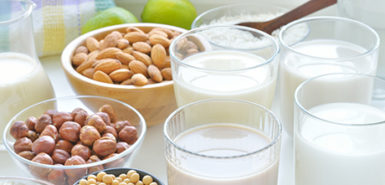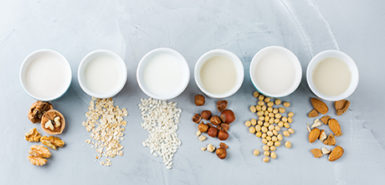
Almond milk, soy milk, rice milk and coconut milk may all offer lactose-free alternatives to cow’s milk, but new research suggests that the dairy version remains the most nutritious option.
The finding stems from a Canadian analysis that assessed the nutritional value of a single serving of the four most popular plant-based milks relative to cow’s milk.
“We thought that a review was much overdue in understanding the nutritional information of various plant-based milks,” explained study author Sai Kranthi Kumar Vanga.
And ultimately, “we were surprised that many of these milks do not have the nutritional density of cow’s milk, both in terms of micro and macro nutrients.
“Nutritionally speaking, cow’s milk is still the go-to beverage that has a balanced profile,” said Vanga, a Ph.D. candidate in the department of bioresource engineering with the faculty of agriculture and environmental sciences at McGill University in Quebec.
The new study was sponsored by the Natural Sciences and Engineering Research Council of Canada and received no dairy industry funding.
Cow’s milk is packed with protein and other key nutrients, including fat and carbohydrates. It also contains some antimicrobial properties, and has been shown to help infants fight off fever and respiratory infections, the researchers said.
But they acknowledge that cow’s milk does raise health concerns. It can carry harmful pathogens, including salmonella and E. coli, and many infants and children are allergic to it, though some outgrow their allergy.
And many adults are lactose-intolerant, meaning they lack enough of a digestive tract enzyme critical to processing lactose-laden foods such as cow’s milk. This is more common among blacks, Asians and Native Americans.
Add to the list a drive to lower cholesterol intake and a growing interest in vegan diets, and many consumers have turned to plant-based milks as an alternative.
To compare the nutritional pros and cons, the researchers reviewed several dozen studies, collected nutritional data from a U.S. Department of Agriculture (USDA) database and analyzed the nutritional labeling of commercially available unsweetened plant-based “milk” products.
The team concluded that while coconut milk is low in calories and gets good marks for taste, it offers consumers zero protein and comes loaded with saturated fats.
Similarly, almond milk was also low in calories and given high marks for taste, while providing a range of fat, carbohydrates and protein comparable to cow’s milk. However, it posed a potential problem for those with nut allergies.
Rice milk ranked comparably with cow’s milk in terms of caloric content, but contained more sugar and did not provide an equivalent range of fat, carbohydrates and protein.
And soy milk was deemed to be lacking in taste and posed a potential problem for those with a soy allergy. But it was found to be rich in protein, while offering a similar balance of fat and carbs to cow’s milk.
“All in all, soy milk is the closest in terms of nutrients to cow’s milk,” said Vanga.
But, he added, “plant-based milks do not have a similar nutritional profile [as cow’s milk] and should not be looked at like a direct substitute, as most of the consumers see it now.”
That thought was seconded by Lona Sandon, program director of clinical nutrition at the University of Texas Southwestern Medical Center at Dallas.
“Plant-based milk alternatives can play a role in the diet, especially for people living with cow’s milk allergies or lactose intolerance,” she noted. “However, they are not nutritionally superior, and do not deserve the health halo many people put on them, or clever marketing would like you to believe.”
What’s more, “the negative hype about cow’s milk has not been found to be justified,” Sandon said.
“People can choose low-fat options to avoid the saturated fat,” she said, “and for those with lactose intolerance, there are plenty of lactose-free cow’s milk options on the market.
“Cow’s milk is still the best option in many cases, particularly for infants and toddlers who need the calories, protein, fat and calcium for proper growth and development,” Sandon said.
The findings were published recently in the Journal of Food Science Technology.
 /a>
/a>
 /a>
/a>
 /a>
/a>
Can you please explain the nutritional profile of cow’s milk that makes it nutritionally superior? What are the specific macro and micro nutrients that make it superior to plant milk? Thank you!
Hi Kaylee! Thank you for your questions. Here is a link to the complete study about which this article was written: https://link.springer.com/article/10.1007/s13197-017-2915-y Also, you might find another article written by Health Beat to be of assistance in regard to plant milk details – https://healthbeat.corewellhealth.org/which-milk-is-the-cream-of-the-crop/. Hope these provide the additional detail you’d like. Cheers, Cheryl
According to the Physicians Committee for Responsible Medicine
http://www.pcrm.org/health/diets/vegdiets/health-concerns-about-dairy-products
-Dairy products have little to no effect on bone integrity
-Milk intake does not promote bone health or health in general
in children
-Dairy consumption has been linked to higher risk for various
cancers (especially of the reproductive system)
-Milk contains contaminants including hormones and pesticides
-Cows milk may increase the likelihood of developing type 1
diabetes
According to Harvard Health dairy products are the 1# source of saturated fat in the American diet
https://www.hsph.harvard.edu/nutritionsource/top-food-sources-of-saturated-fat-in-the-us/
According to the National Cancer Institute dairy products are the 1# source of cholesterol in the American diet
https://epi.grants.cancer.gov/diet/foodsources/sat_fat/crf.html
According to the CDC and American Heart Association high intake of saturated fat and cholesterol are associated with increased risk of heart disease, stroke, and diabetes, our #1, #5, and #7 ranked killers respectively.
http://www.heart.org/HEARTORG/Conditions/Cholesterol/Cholesterol_UCM_001089_SubHomePage.jsp
https://www.cdc.gov/nchs/fastats/deaths.htm
The dairy and milk industry is also a leading contributor to environmental pollution and helps to propagate drug resistant bacteria
https://www.ncbi.nlm.nih.gov/pmc/articles/PMC4764701/
https://www.worldwildlife.org/industries/dairy
https://www.nytimes.com/2015/05/04/business/energy-environment/how-growth-in-dairy-is-affecting-the-environment.html
Just some things to think about : )